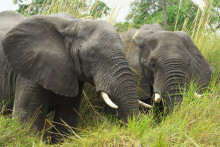Between years 2010 and 2012 the number of illegally killed elephants massively increased. It is estimated that in those three short years, about 100.000 elephants were killed by poachers.
Even though the situation has improved since then, elephant poaching still represents a serious problem in many African countries and ITC researcher, Festus Ihwagi, is doing his part to change that.
Festus Ihwagi is a PhD candidate at the ITC faculty of the University of Twente, where he researches poaching of elephants using field-verified and geo-referenced mortality data. Ihwagi´s recent study in his home country of Kenya showed that the involvement of local communities is key to reducing elephant poaching. The UT researcher explains more about the study and why elephants are such an important part of the African ecosystem.
Monitoring of poaching
'The first goal of my thesis is to model poaching rates in time and space. Afterwards, I want to study how elephants respond to the risk of poaching through analyses of movement recorded using GPS telemetry. It is true that elephants have a very good memory, and so if they learn of a dangerous area, they will avoid it in the future,' describes Ihwagi, whose work has revolved around elephants for the last ten years.
In order to monitor illegal killings, you have to determine when and where they happen. To do that, you need to identify causes of deaths of the elephants. How? On foot.
'We do ground work in Northern Kenya, where we collaborate with local Kenya Wildlife Service rangers, nomadic pastoralists, ranch owners and others, who inform us if they find an elephant carcass. Once that happens, we go there and establish the cause of death, which can vary from natural causes, to human conflict or poaching for ivory. For example, if the carcass is old, we use metal detectors to search for bullets in the skull. The most important thing is to find the motivation for the killing.'
Study in Northern Kenya
Northern Kenya is home to 6500 elephants and it has the most comprehensive data set on illegal killings of elephants in the entire Africa. That was a huge advantage for Ihwagi and his most recent study, which was published in scientific journal PLoS ONE and was a result of collaboration among Save the Elephants, Kenya Wildlife Services, Colorado State University, Northern Rangeland Trust and the University of Twente.
'I wanted to bring the complexity of the study area into perspective. I found that the highest numbers of living elephants are concentrated in private land areas, community conservancies and national reserves,' Ihwagi says about his research. 'Community land offers the best alternative, and so the goal is to form communally owned conservancies with touristic facilities.'
Protected areas, where elephants are relatively safe, of course exist, but they are scarce and elephants move everywhere, therefore the entire ecosystem needs to be addressed.
The importance of elephants
You might think that one dead animal isn´t the worst thing in the world, but unfortunately one killed elephant can lead to many more deaths. 'Elephants are matriarchal, so the oldest female leads the family and represents the knowledge bank of the group, knowing where to go and which places to avoid. If poachers kill the matriarch, the younger elephants get disoriented and roam through dangerous spots,' explains Ihwagi.
'Elephants are key drivers of ecosystems in Africa. They are ecosystems engineers. They break down trees, and therefore open up the forest and make it habitable for other species. Survival of other animals depends on them.' To ensure this survival, people need to be involved, thinks Ihwagi: 'It is important to inform and educate the local communities. Because of Save the Elephants´ and the government´s initiative, community awareness and security patrols have increased. Thanks to that, poaching levels are decreasing.'
Killing the market
Although the issue of elephant poaching seems to have taken the turn for the better, Ihwagi hopes it will disappear completely one day. 'My biggest wish is for the demand for ivory to decline. Poachers only respond to demand for a product. If ivory trade is banned, you kill the market. The problem is that ivory is still legal in some countries, especially in Asia. That is why we have embarked on a major campaign, which also includes using Asian celebrities to inform people.'







